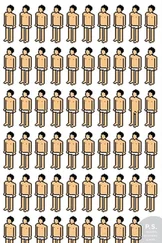Pam and Ham are now gone; she has the room to herself. She looks down at her body—bones marinated in liquid and only vaguely responsive to her will. She has already gained three pounds and she thinks this is a sick joke. She lifts her hand to where her breasts once were; she touches what is now mere parchment and bone, emits a squeak, and sighs.
She surveys her hospital room, her world, almost identical to the room she had during her appendix removal in third grade. Where has she been for seventeen years? What other world did she visit? She is furious with herself for not remembring. Her coma was dreamless, but she knows she went to some place real. Not the place you go when you die—some other place. She thinks back to the previous week, the week before the coma, and she remembers being chased by darkness. Darkness? What? Some of it returns to her. She was trying to find a way to cheat the darkness. And she lost in the end. Shit.
She tries to raise her arm but the sensation is as though she is trying to lift a telephone pole. Megan, her "surprise daughter," will be in soon to help her with stretching exercises. Megan and Lois and Richard are taking shifts. Her tendons apparently need to tenderize before muscle can rebuild. She feels as though she's an item on a menu.
Why has she been kept alive? She can't imagine the point of it. She's happy to be awake but is secretly appalled at the thought of the money and human effort it must have taken to keep her going for so long.
What has happened to the world? What has happened to the people in her world?
She's been awake just a little bit of time, but much is apparent. Richard: He's so different yet he still holds her the way he used to— bodies retain memories long after the mind forgets them. His face is so ravaged. Drinking? How did that happen? And Ham and Pam on heroin? Such a punch line. It's as though Karen walked through a door in 1979 and directly entered a health guidance class showing a film on the unmentioned perils of aging.Wendy, working hard—too hard, it seems. She's not much in love with Linus—obvious to anybody—nor is Linus much in love with Wendy. His soul is full of glue. Karen seems to have understood everyone's life immediately; the others think she is too out of it—too clued out about the modern world—but Karen sees all. She remembers the innocent pointless aims of their youths (Hawaii! Ski bum at Whistler!) and sees that they were never acted upon. But at the same time, larger aims were never defined. Her friends have become who they've become by default. Their dreams are forgotten, or were never formulated to begin with.
Her friends are not particularly happy—not with their lives. Pam had rolled her eyes when Karen asked her if she was happy.
"No."
"Fulfilled?"
"No."
"Creative?"
"A little."
Through the monsters they design and the TV shows they work on, they give vent to the loss they feel inside. Expressions of pettiness, loss, and corruption. She asked not to see any more of their FX photos. Yuck. The photos sit on a stack beside flowers from the mayor as well as from various studios and film production companies wishing to purchase rights to her life story.
On top of it all, the world itself has changed. Karen must try and absorb seventeen years of global changes. That can wait. And she thinks she'll go crazy if one more person tells her that the Berlin Wall came down and AIDS exists in the world.
One week later, Wendy still can't comprehend Karen's return to the living and her complete retention of all her brain power. Wendy knows the medical statistics. To others, Karen's awakening is a lottery win—a prize behind Door Number 3, a pair of snowmobiles. But to Wendy, Karen is a river running backward, a rose that blooms under moonlight—something transcendent, an epiphany.
Wendy thinks of Karen's long rehab road to reach the point whereshe will be able to perform simple everyday functions once more. Brittle bones; atrophied ligaments. Yet her face is already fully animated, and she smiles as clearly as always. Already her arms are now skittishly mobile, storky chopsticks reaching for gum and the squeeze bottle of water. Checks and balances. Karen is a time capsule—a creature from another era reborn, a lotus seed asleep for ten thousand years that springs to life as clear and true as though born yesterday.
Wendy is concerned about swamping Karen with too much information or too much novelty. As a doctor, she can limit certain things. Richard has been coming in with the annual volumes of the World Book Encyclopedia and teaching Karen about the new years leading up to 1997. He is already at 1989: the fall of the Berlin Wall, the AIDS quilt—Karen must be so amazed at this. And then there's crack. Cloning. Life on Mars. Velcro. Charles and Diana. MAC cosmetics. Imagine learning so much stuff at once.
Karen and Pam have spent some hours sifting through style magazines together; Wendy beamed with pleasure at the sight—so much like the old days. Good gossipy jags: "Oh, and Karen, food is amazing these days. It suddenly got good around 1988," Pam says, making Karen eager to try all the new food trends—Tex-Mex, Cajun, Vietnamese, Thai, Nouvelle, Japanese, Fusion, and California cuisine—"sushi, gourmet pizzas, tofu hot dogs, fajitas, flavored ice teas, and fat-free everything."
Lingering in the back of Wendy's mind, though, is the phenomenon of Hamilton and Pam having stereo heroin nightmares. The nurse showed Wendy the tape of stereo dreaming as well as parallel stalagmite brain readouts. So now Wendy has two medical mysteries on her hands at the same time. Best to keep the video hush. Pam and Hamilton are unaware it even exists. Best to scoot Karen home immediately—away from public intrusion.
Megan enjoys visiting her mother at the hospital, where she helps her flex her arms and legs and fingers. She has never been able to help others, and the sensation is as though she had opened her bedroomdoor and found an enormous new house on the other side full of beautiful objects and rooms to explore.
Megan is relieved that Karen has a good sense of humor and, though older, is technically the same age. "Megan, tell me, all the young girls I see on TV these days dress kind of, um …"
"Slutty?"
"Your word, not mine."
"It's Lois's word." Megan giggles. "Lois is from another era where girls had to be doormats. Nowadays we dress for strength. Didn't you?"
Karen ponders her adolescence: "No. I think we felt equal to guys but never more forceful than them."
"I guess that's a switch. Soon we'll have you going to the gym."
"I think I'm a bit far gone for that."
"Crap—Mom." Megan loves saying Mom with extra vim, as each mention is a small stab at Lois.
Yes, Karen is happy to see that Megan is rebellious—and that she talks back to Lois. Karen had never dared. Megan is also angry—at Richard and at her parents and at the world. And Karen is angry with Richard for being so shiftless in helping raise Megan. That's something to be dealt with in the future. Karen is mad and lost and found and bewildered. The new world lies before her eyes like an opened chest of treasure, a flock of birds over Africa, a thousand TVs all playing at once.
Wendy thinks about Karen. Unsurprisingly she is front-page news the world over; a medical oddity, a feature-section story, tabloid grist. Yet the only photo the media have is Karen's old graduation photo. The media have been unable to snap a new picture of Karen; such a photo has become the golden fleece of journalism. There have been attempts to bribe relatives—Wendy herself was approached by a French photographer, Linus by the Germans. Such cheek. And to think that Karen never wanted to be photographed even at the best of times—it would be too cruel to exhibit her in such a frail, emaciated state.Friends and family want to protect Karen and her innocence from the modern world, the changes that have occurred since her sleep began. Her innocence is the benchmark of their jadedness and corruption. The world is hard now. The world doesn't like simplicity or relaxation.
Читать дальше










